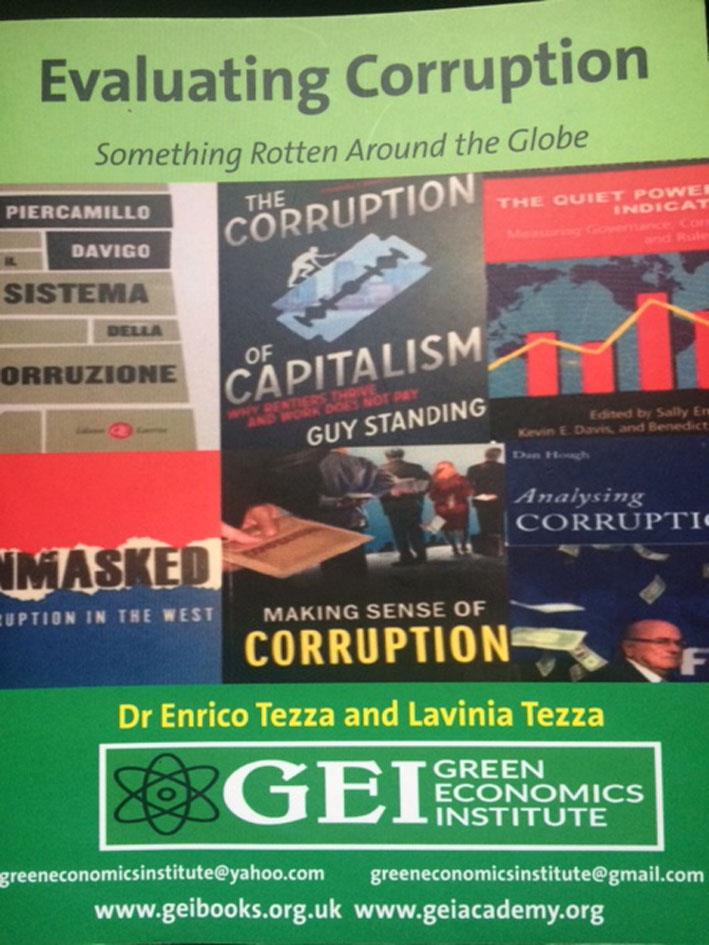What made you want to write on corruption?
I have been studying evaluation of public policy for 20 years within different public authorities such as the Veneto Region or the Italian Ministry of Labour. The focus of my evaluation effort has been the logical link between Output and Result, which leads to the impact and related change in population in needs. Even during my career at the International Labour Organisation Turin Centre, I developed an evaluation model addressing to the effectiveness dimension of programmes and projects.
In 2017, during the Green Economics Conference in Oxford organised by the Green Economics Institute, I was involved in a discussion on corruption and I realised how underestimated the evaluation issue in dealing with corruption is. This awareness leads to a study on a tentative evaluation framework, subsequently described in Evaluating Corruption, edited in collaboration with the Green Economics Institute.
Do you think that we can overcome poverty by fighting corruption?
Literature highlights that corruption exacerbates conditions of poverty such as low income, poor health and education status, vulnerability to shocks and other characteristics.
It is acknowledged that corruption increases poverty and inequalities, prevents a free market and exploits marginal groups. Countries experiencing chronic poverty are seen as natural breeding grounds for systemic corruption due to social and income inequalities and perverse economic incentives. The casual relationship between corruption and poverty has been proven by several studies. Hence, corruption is the main obstacle to fight poverty, since corruption feeds itself from antipoverty funds. Peter Eigen and Michael Wiehen, former World Bank officials, founded Transparency International, whose pressure urged the international organisation to recognise that corruption was the key problem in poor countries.
As a result, considering the correlation between the increase of poverty rate and the increase of corruption in poor countries, the fight against corruption has been ineffective. However, fighting corruption remains the priority for a development strategy. Needless to say, anticorruption policies should be accompanied by an ethical perspective able to overcome private interests and public office bias.

Which institutions do people perceive as most corrupt?
Alina Mungiu-Pippidi studied the perception on Governmental institutions and showed that all Members States have regressed in controlling corruption since they joined EU. She defines control of corruption as the capacity of governments to constrain corrupt behaviour in order to enforce individual integrity in public service and uphold a state free from the capture of particular interests.
According to the "state capture" hypothesis, public institutions at large are perceived as most corrupt. State capture is a situation where powerful individuals, institutions, companies or groups within or outside a country use corruption to influence a nation's policies to benefit their own private interests. It is worth recalling the parliamentary speech of Italian Prime Minister Bettino Craxi since it provide evidence of what is called "systematic corruption": "What needs to say and which in any case everyone knows, is that the greater part of political funding is irregular or illegal. If the greater part of this is to be considered criminal pure and simple, then the greater part of the political system is a criminal system". The United Nations' Secretary-General Ban Ki-moon, pointed out that gauging perception is like measuring smoke rather than seeing the fire.
The Oil-for-food scandal is a further example confirming the involvement of public institution even at international level. In addition, Deutsche Bank scandal on money laundering shows that financial institutions are not immune from corruption.
Do you think that technology and artificial intelligence can find out which politicians are corrupt?
The new generation of anti-corruption policies are based on digital technologies and big data.
In particular, Blockchain is the most potent tool against corruption by providing transparency through a decentralised system that records the sequence of transactions. It allows the full traceability of every transaction. According to Carlos Santiso, Blockchain is particularly suited to fight corruption in the registry of assets and the tracking of transactions such as procurement processes. By leveraging a shared and distributed database of ledgers, it eliminates the need for intermediaries, cutting red-tape and reducing discretionality.
In 2015, Mark Walport, chief scientific adviser to the UK Government, presented a report on "Distributed Ledger Technology: beyond block chain" which highlights the application of block chain technology in government policy toward transparency and integrity. In the same line, an official of the Veneto Region, Marcello Zanovello, is studying the applicability of Blockchain against the misuse of public office.
In conclusion, academic world and practitioners confirm that mainstreaming this technology will improve anti-corruption policy.
Malta is the 46th least corrupt nation out of 175 countries, according to the 2017 Corruption Perceptions Index reported by Transparency International. What are your comments?
European Northern Countries are perceived free from corruption when dealing with bribery, but when conflict of interest is considered, they result the most corrupt countries. Despite its prominence, the Corruption Perception Index has become increasingly controversial in recent years. Definition problems, perception bias, false accuracy, a flawed statistical model are prevalent weak factors. The mismatch between perception and experience undermines the credibility of survey on corruption based on perception. However, when the Maltese media highlights that corruption is the country's biggest challenge, one can conclude that corruption is "real" even in Malta. At the same time, the initiative of the Malta Federation of Liberal Profession on Professional ethics confirms the presence of economic actors moving toward a corruption free culture.